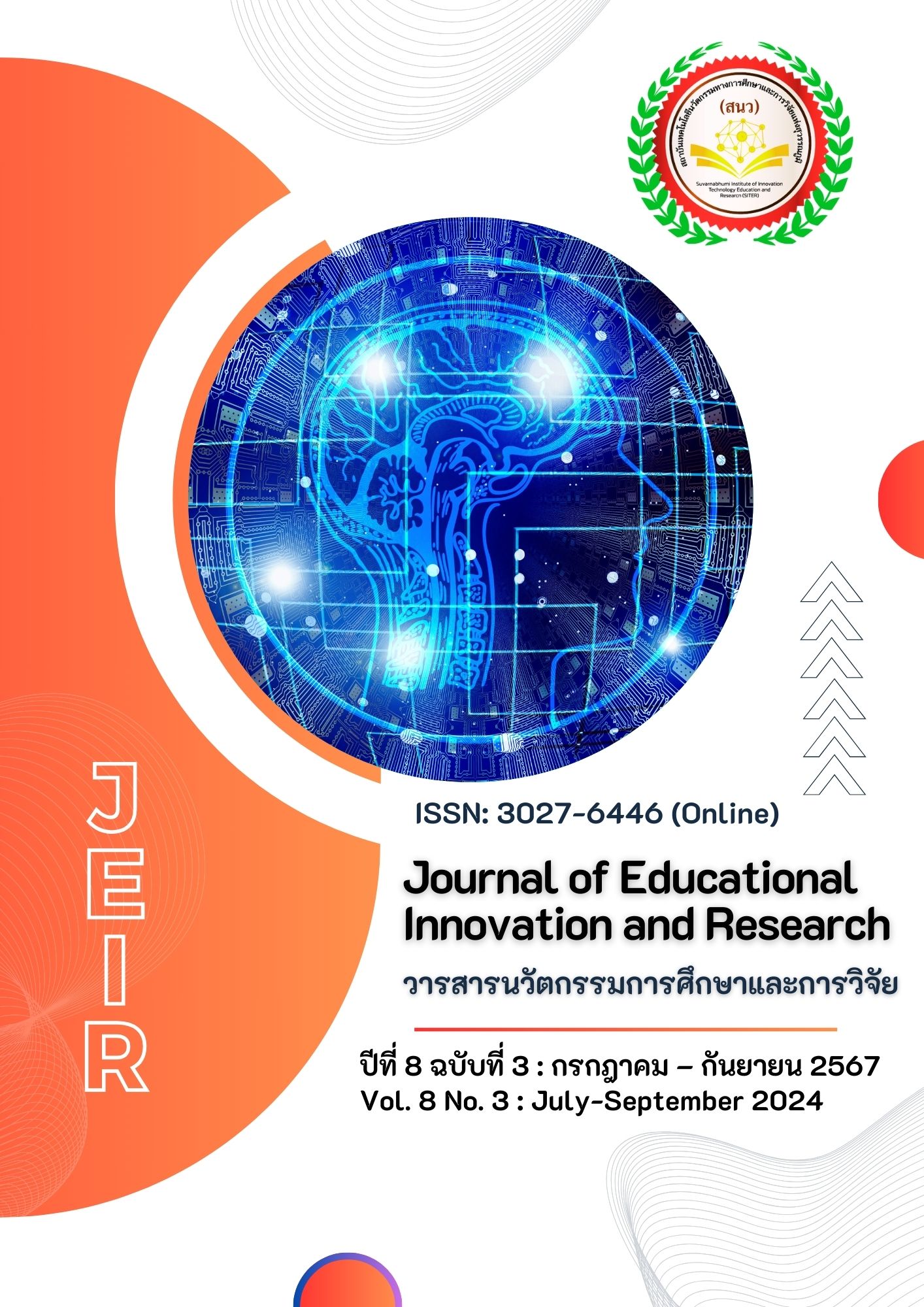กระบวนทัศน์การพัฒนาหลักสูตรสังคมศึกษาแนวดิจิทัล เพื่อส่งเสริมความเป็นพลเมืองดิจิทัลในห้องเรียนวิถีถัดไป
Main Article Content
บทคัดย่อ
บทความนี้มีวัตถุประสงค์เพื่อ 1) ทบทวนกรอบแนวคิดกรอบแนวคิดการศึกษาหลักสูตรสังคมศึกษาแนวดิจิทัล เพื่อส่งเสริมความเป็นพลเมืองดิจิทัลในห้องเรียนวิถีถัดไปและ 2) เสนอแนวทางการพัฒนาหลักสูตรสังคมศึกษาแนวดิจิทัล เพื่อส่งเสริมความเป็นพลเมืองดิจิทัลในห้องเรียนวิถีถัดไป ผลการศึกษาพบว่า หลักสูตรสังคมศึกษาแนวดิจิทัล เพื่อส่งเสริมความเป็นพลเมืองดิจิทัลในวิถีถัดไป เป็นแนวทางพัฒนาการเรียนรู้จากการเปลี่ยนแปลงทางสังคมดิจิทัลในปัจจุบัน การสร้างพื้นที่ห้องเรียนเสมือนผ่านเทคโนโลยี การสร้างปฏิสัมพันธ์รวมทั้งการใช้สื่อสารสนเทศอย่างหลากหลาย การเปลี่ยนแปลงทางวัฒนธรรมในปัจจุบันส่งผลต่อการเรียนรู้เด็กและเยาวชนในระบบการศึกษา ก่อให้เกิดการเรียนรู้ได้อย่างรวดเร็วและแพร่หลาย จากการเปลี่ยนแปลงข้างต้น การสร้างความฉลาดรู้ทางดิจิทัลและการรู้เท่าทันสื่อแก่ผู้เรียนจึงเป็นสิ่งสำคัญเพื่อให้ผู้เรียนเกิดทักษะการคิดอย่างมีวิจารณญาณ กล่าวคือ การสร้างความตระหนักและการเรียนรู้ทักษะการใช้ดิจิทัลได้อย่างเท่าทันและเหมาะสม ผ่าน 3 มิติ ดังนี้ 1) การมีความรู้และความคิดสร้างสรรค์ทางดิจิทัล 2) คุณธรรม จริยธรรมและความรับผิดชอบต่อสังคมดิจิทัล และ 3) การมีส่วนร่วมและการเป็นผู้นำทางเศรษฐกิจดิจิทัล รวมทั้งการประยุกต์ใช้สื่ออย่างสร้างสรรค์เพื่อให้สอดคล้องกับการสร้างพลเมืองดิจิทัลในห้องเรียนวิถีถัดไป ผ่านกระบวนการ Digital Social Studies Curriculum Development Model หรือ 4D Model ดังนี้ 1) วิเคราะห์หลักสูตรและบริบทพื้นถิ่นดิจิทัล (Digital Area Analysis :D) 2) การกำหนดเป้าหมาย (Destination :D) 3) การออกแบบและพัฒนาหลักสูตร (Design and Development :D) และ 4) การประเมินผลเครือข่ายดิจิทัล (Digital Evaluation :D) แนวทางการพัฒนาหลักสูตรสังคมศึกษาแนวดิจิทัลถือเป็นสิ่งสำคัญที่จะต้องมีการปรับเปลี่ยนกระบวนทัศน์หลักสูตรสังคมศึกษาแบบเดิมที่นำไปสู่การพัฒนาหลักสูตรสังคมศึกษาแนวดิจิทัลที่จะเป็นตัวทำให้เกิดระบบนิเวศการเรียนรู้แบบองค์รวมในด้านสื่อและเทคโนโลยีให้เกิดประสิทธิภาพในการจัดการสังคมเทคโนโลยีพื้นที่ห้องเรียนวิถีถัดไปในอนาคต
Article Details

อนุญาตภายใต้เงื่อนไข Creative Commons Attribution-NonCommercial-NoDerivatives 4.0 International License.
เอกสารอ้างอิง
Barnstable Public Schools. (2023). Digital Curriculum. https://www.barnstable.k12.ma.us/domain/394.
Burns, T. and Gottschalk, F. eds. (2019). 21st Century Children as Digital Citizens. https://www.oecd-ilibrary.org/sites/b7f33425-en/index.html?itemId=/content/publication/b7f33425-en.
Chusaengnil, C., (2019). Digital Intelligence. https://www.scimath.org/article-technology/ item/10611-digital-intelligence.
Common sense education. (2020). Digital Citizenship Curriculum. 2020-digitalcitizenshipcurriculum-overview-final-release.pdf (commonsense.org).
Fang, R.J., Wang, S.H., Lin, T.Y., & Tsai, H.L. (2008). The Digital Curriculum Design and Implement of Teacher’s Professional Growth. ResearchGate, 148-152.
Inthanon, S. (2020). DQ: Digital Intelligence. Pathum Thani: Walk on Cloud Company Limited.
Jatuporn, O. (2017). A Development of Local History Curriculum Based on Place-Basededucation Approach for Primary School Students: A Case of An Upperchao Phraya River Community, Nakhon Sawan Province. Journal of Education Naresuan University, 21(4), 342-356.
Liangpanit, S. (2018). Digital Learning Model by Problem-Based Learning in Thailand Age 4.0. Panyapiwat Journal, 10, 208-224.
Malak Z. Alamri, N. Z. Jhanjhi & Mamoona Humayan. (2020). Digital Curriculum Importance for New Era Education. Information Resources Management Association, 1-3.
Mangkhang, C. (2022). Concept in Action the Social Studies Curriculum Development. Chiangmai: Lanna Printing.
Mangkhang, C., & Kaewpanya, N. (2021). The Digital Etiquette Enhancing to Global Citizenship of Social Studies Teachers in a New Normal Society. Higher Education Studies,11(3), 89-94. doi:10.5539/hes.v11n3p89.
Mangkhang, C., Jitviboon, K., Timcharoen, T., & Kaewpanya, N. (2021). Curriculum Development Innovation by Area-based Approach: A Case Study ofLocal Curriculum of Haripunchai History. Journal of MCU Peace studies, 9(2), 630-644.
Mangkhang, C., Wannapaisan, C., Jarupongputtana, C., & Kaewpanya, N. (2021). Innovative of Local History Learning Design Through Area-Based Approach of Social Studies Teachers to the Promoting Happiness Historical Consciousness of Basic Education Students in Northern Thailand. Turkish Online Journal of Qualitative Inquiry, 12(8), 3361-3378.
Micu, M. (2019). the Impact of the Digital Curriculum on Students Learning. The European Proceedings of Social and Behavioural Sciences, 1464-1472.
Ministry of Education. (2008). Basic Education Core Curriculum B.E. 2551 (A.D. 2008). Bangkok: The Printing House of the Teachers' Council.
Neanpan, M. et al. (2020). Development of a curriculum to enhance life skills in the digital age for students at the lower secondary level of schools under the Bangkok Metropolitan Administration. Curriculum Research and Development Journal, 10(2), 90-104.
Office of the Education Council. (2017). Thailand Education Scheme in Brief (2017-2036). Bangkok: Ministry of Education.
Phoodee, W. and Pianpailoon, C. (2021). the Scenario of Teachers after the Covid-19 Crisis. Panyapiwat Journal, 13(2), 321-330.
Sirivisalsuwan, P., Nillapun, M., Kheovichai, K., & Satiman, A. (2020). The Development of Curriculum to Enhance Life Skills in Digital Age for Secondary Students of Bangkok Metropolitan Administration School. Journal of Research and Curriculum Development, 10(2), 90-104.
Tongkeo, T. (2020). New Normal Based Design in Education: Impact of COVID-19. Urnal of Teacher Professional Developmen, 1(2), 1-10.
White, S., Ragkhanto, S. and Srikhruedong, S. (2021). Human: Digital Citizenship. Journal of MCU Humanities, 7(2), 339-354.
Wongkitrungreang, W. (2018). Digital Citizenship Book.Bangkok: Digital Economy Promotion Agency.
Wongyai, W., Patphol, M. (2019). Digital Learning. Bangkok: Innovative Leaders Center of Curriculum and Learning.


